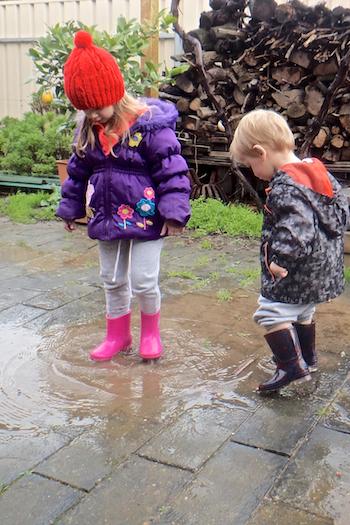It's wet out there
Duration/age

The rain has fallen, the sun is out and everyone’s keen to get out the door and go.
What do you do when you get out and everything is wet and damp? You could go on a discovery walk. Talk about the different things you might see or find.
The rain is dripping off the tip of the leaf.
Are there different creatures that come out after the rain? Have things fallen out of the trees that you would not normally see? Are there puddles with floating leaves or sticks?
If the rain has been falling for a long time there might be rivers of water rushing down the gutters in the street. You and your child could have a boat race using sticks or leaves that you’ve found on your travels. Who can get to the end first? Are there obstacles in the way that make your boat crash?
Materials you will need
- Your eyes and ears
Skills this activity improves
Why does this matter?
The development of observation skills helps children to sort, group and classify objects. When children are able to notice the differences between objects, they can start to compare and use language to describe what they see.
As your child wanders around after the rain and shares with you what they have found they are developing descriptive and positional language. This enables your child to explain to another person where to go to find something. It also means your child will be able to explain what they have seen without having to show it the other person.
What does this lead to?
Noticing, exploring and wondering about the natural environment helps children to develop the disposition to be become more curious and creative.
When children develop the dispositions to be creative and curious they are more likely to ask and pose questions, investigate why things happen and take control of their own learning. When a child is curious and creative they are more likely to explore different ways to present information and to take risks
Language to use
- Water, puddle, wet, drenched, pooled
- Moving, rushing, still, bubbling, dripping
- Creature, slug, snail, bug, insect
- Gutter, drain, kerb
- Float, sink, plop
- Dry
- Race, fastest, slowest, first, last
Questions to use
- Do all insects come out after it’s been raining?
- Where do snails hide when it’s hot?
- When the water drains away where does it go?
- Do all things float?
- Which is fastest?
Useful tips
- You might also like to take a look at the activities Jumping over puddles and Look, up in the sky!
- Remember to talk to your child in your home language.
More ideas
- Create a noticing and observations box. You could include magnifying glasses, tweezers and small containers for collecting treasures.
- Make a rain gauge outside for measuring and collecting rainfall.
Variation by age
Birth to two year olds
- Collect different natural objects from around the yard. Experiment with floating them on top of a puddle.
- Sort your collection of found objects into big and little.
- Make boats from leaves and race them down the gutter. Experiment with different sized leaves. Is a bigger leaf faster or slower?
- Collect small containers and use them for scooping and pouring. Experiment with how small they need to be to scoop up water from a puddle.
Three to five year olds
- Collect different natural objects from around the yard. Experiment with floating them on top of a puddle.
- Sort your collection of found objects into big and little.
- Make boats from leaves and race them down the gutter. Time how long it takes to reach the end.
- Trace around a puddle. Time how long it takes for the puddle to evaporate.
- Experiment with making your own rainwater tanks.
- Record the rainfall each day on a calendar. Which month has more rain?
Questions to ask
- Which is fastest?
- Which one is the biggest?
- Do all the objects float?
- How many containers have you filled?
Questions to ask
- Does more rain fall during the day or at night?
- What shape container is best for collecting rain?
- Is the smaller boat faster than the bigger boat.
- Which objects sing to the bottom?
Language to use
- Big, little, small, large
- Same, different
- Sort, group
- Race, fastest, slowest, first, last
- Float, sink
- Heavy, light
- Fill, scoop, pour, collect
Language to use
- Big, little, small, large
- Same, different
- Sort, group
- Race, fastest, slowest, first, last
- Float, sink
- Heavy, light
- Fill, scoop, pour, collect
- Rain, fall, record, calendar


